|
Newaygo County Register of Deeds Stewart Sanders announced on Tuesday April 2, that he will seek re-election as Register of Deeds for a third term. “It has been an honor serving as Register of Deeds for the past 10 years,” Sanders said, “and I am excited about the opportunity to continue serving in this role. Since my appointment in 2014, we have worked hard at continuing to pursue best practices for recording, document security, and preservation.” Sanders will again be a candidate for the Republican nomination in the August primary. “I am extremely proud of the advancements we have made using new technologies to help save time and money for our constituents,” said Sanders. “In addition to these advancements we have introduced our Property Fraud Alert Service to help notify constituents of any activity regarding their properties.” “If re-elected,” he said, “I will continue to pursue best practices regarding the protection and integrity of our database involving the public record. With the rise of cybercrimes, it is critically important to stay informed of the resources necessary to secure the County’s record. In addition, I will continue to build positive relationships throughout the County to build trust by providing the best possible customer service.” Stewart Sanders is a graduate of White Cloud High School, Ferris State College with a Bachelor of Science degree in mathematics, and Central Michigan University with a Master of Arts degree in administration. Sanders taught in Newaygo for 33 years and Baker College for 21 years. He also coached track and field and cross-country in Newaygo while also coaching track in Fremont. Sanders was appointed to the position of Register of Deeds in June of 2014 after the retirement of Linda Landheer. During the time he has been in office, Register Sanders has worked hard to build on the work of previous office holders. Mr. Sanders has been active in many community activities such as serving on the White Cloud Rotary, Newaygo County United Way Committee, and being a committee member of the Gerber Scholarship. Stewart continues to stay active in professional organizations such as the Michigan Association of Registers of Deeds (MARD), serving as President in 2020 and being named Register of the Year for 2020. Sanders is also the Legislative Co-Chair for MARD. He is a member of the United County Officers Association of Michigan and is a Certified County Officer (CCO) and served as President from 2021 to 2023. These organizations provide necessary educational opportunities to stay informed of current resources that pertain to County Elected Officials. Sanders indicated that he is” grateful” for the support and trust of the residents of Newaygo County and hopes to continue working with all constituents and stakeholders.
0 Comments
Hesperia's Vida Weaver Park gets a new addition
Hesperia, MI [APRIL 15, 2024] - The Village of Hesperia is thrilled to celebrate the groundbreaking for the newest addition to Vida Weaver Park, a state-of-the-art pavilion set to enhance the community's outdoor experience. The new pavilion, sparked by Hesperia Beautification, is made possible through funding from the Oceana County ARPA committee, MEDC Revitalization and Placemaking 2.0 Grant Program via The Right Place’s regional grant award, Community Foundation for Oceana County, Village of Hesperia and other community stakeholders This park enhancement will serve as a focal point for gatherings, events, and leisure activities, fostering a sense of community and belonging on the banks of the White River. The Village of Hesperia is deeply grateful to the funders whose support has made this project a reality. Their commitment to enhancing the quality of life in Hesperia is commendable, and we look forward to the positive impact the pavilion will have on our community. For more information about the groundbreaking ceremony or the Vida Weaver Park Pavilion project, please contact the Village of Hesperia at 231.854.6205 Vida Weaver Park is a beloved community space in Hesperia, known for its access to the White River, picturesque setting and convenient location. The addition of the new pavilion underscores the village’s dedication to providing accessible and inviting outdoor spaces for residents of all ages to enjoy. At their annual Heroes Celebration, United Way of the Lakeshore awarded the CBD Store of Michigan the Community Builder Award. Community Builders support United Way of the Lakeshore through workplace campaigns, volunteering, and much more. CBD Store of Michigan in Fremont was recognized for always willing to step up when needed. Beyond collecting items for drives like the Baby Product Drive, Hygen Drive, Food Drives, Toys for Tots and many more, store owner Rod Glupker is always there to volunteer in community projects. Rod has helped build playgrounds in the community, assisted with painting and clean up projects as well as providing help for programs such as Dolly Parton's Imagination Library. Receiving the Community Builder Award recognizes CBD Store of Michigan’s commitment to the community it serves Glupker is a Board Member on the Fremont Area Chamber of Commerce and the United Way of the Lakeshore-Newaygo County, He is als a member of the Downtown Development Authority, the River Country Chamber of Commerce, the Hesperia Chamber of Commerce, and the Grand Rapids Chamber of Commerce. “I want to thank United Way of the Lakeshore for this honor,” said Glupker. “I love our community and only want to make it a great place to live and work for all.” Lindsey Mahlich and Mindy Conley are challenging current board members Rachal Gort and Richard Vance in a recall election for the two seats on the Grant Public School Board. We reached out to the candidates asking them to participate in answering a series of questions for the community. Each agreed to participate, however despite numerous attempts to get some type of acknowledgement from Ms Gort since we distributed the questions more than a week ago, we regrettably have not heard from her. Thus, here are the responses from Ms. Conley Ms. Mahlich and Mr. Vance. And please remember to exercise your right to vote on May 7th. -N3 Why are you the best candidate for the school board position? Ms. Mahlich: My greatest strengths are listening, learning, and advocating for those who need it most. I am willing to sit down with all parties to listen and understand their thoughts/ideas before I make a decision that impacts our students and staff. I am willing to advocate for and push our needs at a state and federal level to ensure our voice is heard. I am optimistic even in times of trial. I try to focus on what we can do to achieve our goals rather than what we cannot. Part of my optimism includes the understanding that we will hit tough times and have to have difficult conversations, and it is best to face them head-on and work through them immediately rather than avoid them. Mr Vance: I am an honest candidate for the Grant BOE because of my leadership experiences in business management, private camp programs, non-profit organizations and having a life coach to achieve better as a husband and person. Ms. Conley: I have always worked as part of a team, and more often than not found myself leading that team. I have worked in management roles in a non-profit and currently work for a for-profit company. I have experience in policy development, and have also developed and revised various processes to reduce redundancy and improve employee experiences and project outcomes. I have been a volunteer in my kids’ classrooms, been a Girl Scout co-leader, been a coach, referee, and board/area staff member for AYSO. All of these experiences have taught me how to communicate effectively and work well with others, and I have developed a passion for providing educational and recreational opportunities for the children of this community. I believe I would be a great asset to the board and the school district. What is your own experience with public education? Mr. Vance: My experience in public education is 3-fold: 1.) I was reared in a public school system and performed in multiple sports, president of student council, performed in theatre and was a member of the Honor Society, 2.) One of our children attended a public school, 3.) I have been a H.S. diving coach and I am involved with the Michigan Association of School Boards as part of the By-Laws and Resolution Committee. Ms. Conley: I attended public school K-12 and I also attended the University of Michigan. The school district I grew up in is much bigger than Grant, and was also a very good public school with a lot of options to meet different student needs. I have been surrounded by public school teachers my whole life as well, most notably my mom as a special education teacher and my husband who teaches at Grant High School. I have been surrounded by public school issues for most of my life, even when I have not been a student. Public schools are at the very heart of every community, and we need to support them. Ms. Mahlich: I graduated from Grant High School and attended Michigan State University to study animal science, then Baker College for business. Recently, my son graduated from GHS and is pursuing a career in welding, thanks to his training from the career tech center. I have a daughter who is a freshman and another son and daughter who will start their academic careers as kindergarteners in the fall. Prior to the recall, I attended school board meetings, listening and learning, to help prepare myself for an opportunity on the board. I have attended several free training courses from MASB on topics like the Open Meetings Act and school budgeting. I read and listen to podcasts on issues impacting our school system. I also have met with administrators and the superintendent to share ideas on strategic planning and moving the district forward. What do you see as your primary responsibilities as a board member? Ms. Conley: My primary responsibility will be to work with the other board members in setting policy for our district, and guiding and supporting our superintendent as he works with our district administrators and teachers to deliver a quality education for our students. I also see it as my job to be an advocate for all our students in the district, and to advocate for the district itself and our community too. Ms. Mahlich: My primary responsibility as a school board member is to provide governance and leadership within the school district. I will ensure we stay aligned with the strategic plan and challenge the district to always find that higher grade of excellence. I will support strategies that help us attract and retain the best staff to support our students. Mr. Vance: The BOE responsibilities are to provide oversight in planning, policy conformity, financial management, and academic/legal issues as part of the community citizens. What do you see as the strengths of the District? Ms. Mahlich: We have some fantastic staff and administrators who can help us move forward. My children are better people thanks to the mentorship and interactions with GPS staff, coaches, and community members. We can take the strength and knowledge of our community and expand our relationships even more by clearly communicating with the community the district's progress and what we need their help and support with. Mr. Vance: The strengths of the GPS District are as follows: 1. Hard working parents, 2. Good facilities, 3. Teachers that care about students, 4. Students that desire to excel, 5. Businesses that take an interest in the District. Ms. Conley: For a small district, we really have a lot of opportunities and resources available for our students. The Spanish Immersion program is an incredible opportunity for our students to become fluent in another language and to grow up with a wider view of the world. Both my kids went through this program and have really benefited from it. We also have some great options for high school students with the Early College, Dual Enrollment, and Career-Tech Center programs. The student population of my high school was about the size of our entire district, and we didn’t have any of those options when I was in school. We also have some really great options for students to see more of the world than just West Michigan with the optional trips that are offered for 8th-12th grades. What do you see as the biggest challenges? Mr. Vance: The biggest challenges for the District are as follows: 1.) Continue to re-organized and to fully function within the parliamentary procedures, 2.) Review all policies and bring them up to date, 3.) Assist the administration to get a transparent understanding of the financial position of the district Budget. Ms. Conley: I think our biggest challenge is funding. We desperately need to develop more secure sources of long-term funding. Grant funds are helpful, and can provide funds for a variety of programs, but those programs can only go so far when our buildings are in dire need of repair and upgrades. We need to make some big investments in our schools. The school district is the heart of Grant, and we cannot let it flounder. We’re also facing a huge challenge right now in terms of community perception and discord—so much division has happened over the last year and a half, and we need to find a way to come back together for our kids. The opportunities and education we offer them is of the utmost importance, and we need to get back to focusing on that. Ms. Mahlich: Some of the challenges we are facing right now include staff/administration burnout, funding stabilization, and a decline in student enrollment. With an uncertain/polarizing social climate, we all need to focus on keeping unrest out of the schools and on academic achievement and student and staff development. What is your vision for GPS? Ms. Conley: My vision for our district is to provide a quality education and experiences that prepare our students to follow whatever path they choose to take in life. Our students should be able to find a life path they love, whether it is in skilled trades, pursuing a college education, or something else entirely. It is our job to provide them the tools they’ll need to navigate life as an adult and give them the confidence to try new things. Ms. Mahlich: I envision GPS being focused on excellence and helping build the leaders of tomorrow. I want us to be a district where all students are treated equally in a safe, caring environment, but we recognize and celebrate students on their individual achievements. Mr. Vance: My vision for the GPS District is to see a reverse of the 20-year attendance decline that has resulted in almost 1,000 less students. As a result, that is approximately a 10-million-dollar budget cut in today’s state funding. Can you tell about a time you made a decision that turned out to be the wrong way to go and how you handled it? Ms. Mahlich: I have served on a board of education at a local private school. As a board, we wanted to look at and evaluate new math curriculum, so we went to the administrator to start that process. The administrator made a recommendation, and I did not do my due diligence to fully understand how the new curriculum would impact our teachers and their ability to teach. I was slow to acknowledge the issue and address it immediately, which caused a delay in getting the right solution in place for the math curriculum. To ensure this doesn't happen again before making decisions, I always confirm the evaluation process is clearly defined so we can evaluate and pivot if needed. Mr. Vance: Handling personal and business wrong decisions along with conflict resolution go together. I continue to learn that wise counsel come from wise people, not necessarily someone on social media. It is critical to listen to all sides, know what and why the decision is right or wrong, be patient and understanding, and most of all, be forgiving with a soft answer. Ms. Conley: I really try to gather all the pertinent information at the start of a project or situation and consider the long-term outcomes before choosing a path to follow. This has helped me to make big decisions without a detrimental outcome. I definitely have made mistakes, but they haven’t been mistakes with significantly bad results. There have been projects that I’ve started from the wrong approach or where I missed some key information, but once I figured that out, I did what I could to correct it by taking responsibility for the error I made and offering a solution (or multiple solutions) for it. I am definitely a “fix-it” kind of person, so once I recognize a problem I move on to finding a solution rather than dwelling on the mistake. Describe your experience with conflict resolution and consensus building. Mr. Vance: (see previous response) Ms. Conley: I’m a museum exhibit designer, and that doesn’t happen in a vacuum. It’s never just me working on a project—there is input from community/client stakeholders, there is budget and content input from the institution itself, there are differences in opinion on aesthetic design choices, and sometimes there is conflict in topic choice or tone in presenting different sides of a story. As the team leader I am often the one handling those conflicts and trying to mediate a solution between everyone else on the team. I typically work on leading the team through conversations at various stages of the process so that we come to some sort of consensus at each step—this helps reduce the need to backtrack later because we worked together to make sure everyone was in relative agreement at each stage before moving on. We work to identify end goals before we start this process to be sure we’re going in the right direction every step of the way. I am currently working on a project that has been nearly a year in planning already, but new funding sources have opened up that could help get the project completed sooner than expected, so we’re reworking our plans to not only hold on to the original end goals, but to incorporate some new focus spots to help meet the funding requirements. Sure, it’s going to extend the timeline, but following the proper processes and putting the work in up front will ultimately have a better long-term result. Ms. Mahlich: Conflict resolution and consensus building have been daily throughout my twenty-plus years in technology. In my current role, in customer experience and quality, I work with customers where my organization has failed to deliver on its commitment or a major issue has transpired. I bring all stakeholders to the table to get them to agree on priorities and build out a success plan, then ensure the success plan is executed and we deliver on our commitments. What change would you like to see in our schools? Ms. Conley: I would really like to see the Spanish Immersion program expand. This was a goal that was set when the program first started, back when my oldest started school in 2012, but is only just now really starting to happen with expanding into 5th grade. I’d like to see it eventually expand into the high school too. I’ve heard a lot about bullying being an issue in our schools over the last few years. I know it’s not a new phenomenon, nor is it one that is easy to address, but I’d like to work on building a future for our district where everyone is accepted and where we can find value in our differences. Ms. Mahlich: Before I get behind any changes, I would love to get ideas from our students on what they want to see changed. Before you make a change, you need to understand the goal/results you are trying to achieve. This logic can be used for simple or advanced issues. For example, I want GPS to be a state leader in reading literacy. What if we asked the administrators to do a brainstorming session with all of the third graders and see what ideas they have to get kids to read more books and make it a fun competition? The class with an idea that gets implemented wins an ice cream party. The idea could be as simple as ensuring we have more copies of a specific type of book. Then, as board members, we can support the administration and staff to make it happen. Change happens with small incremental changes we can control. If we want to know how to improve things, we must understand what students, families, and staff believe will make it better. The process in more complicated scenarios must include evidence. For example, if the administration comes to the board and says the only way to improve reading scores is to purchase this specific curriculum, I would want more details from their professional perspective and the evidence that may exist to back their position. Mr. Vance: (No answer provided) What was your favorite book in high school? Ms. Mahlich: I am an avid reader, thanks to many great ELA teachers laying a solid foundation for me in my years at Grant. In high school, my ag-science teacher at the time mentioned The Jungle by Upton Sinclar during a discussion about meat processing, and I was intrigued. Although I am trying to remember how I found my first copy of the book, the book taught me so much about the realities of the world and the importance of advocating and standing up for what is right. I highly recommend this book to anyone who wants to learn some of the brutal history of our food system and industrialization on the backs of immigrants. This book honestly made an impact on my life. Mr. Vance: My favorite books in High School were: My earth science textbook, my special read -Rommel in North Africa and the greatest book ever, The Bible. Ms. Conley: I read a lot of Stephen King books back then, and The Talisman was one of my favorites, though I fell in love with The Gunslinger series in college. I also happened to like reading Shakespeare when that came up in my high school English classes, so much so that I actually chose to take a Shakespeare literature class in college. And finally the ‘Elephant in the Room’ question: There is obviously a lot of division in the community since the health center controversy began. What do you plan on doing going forward to help heal this divide? Mr. Vance: The “elephant in the room” that you are referring to, began prior to my term on the BOE. That elephant got in the room through unnecessary back doors left open. With that said, I will continue to promote Tradition in Curriculum Standards and Community Values, Truth in Student needs and Parental Rights, and Trustworthiness in Financial Matters and Administrative Functions. Ms. Conley: I want to bring the focus of the school board back to education. The health center is a valuable resource for our students and our community, but it shouldn’t be the primary focus of our school board. I want to help bring our community back to having conversations rather than one-sided arguments and ultimatums, so that we can all get back on track. Transparency and open communication are key—I feel the community is very suspicious of the school board right now because it seems like they just keep choosing to close or remove things that they don’t like, rather than putting in the effort to improve them to something we can all be proud about. As a manager I have always made an effort to support my staff and find ways to help them learn and improve. Our school board needs to do the same thing here: instead of pushing people or support services out, we need to find ways to help build them into the best providers for our students. We can do better and we can be better if we just start talking to each other and include more voices in the conversation. Ms. Mahlich: We can and will recover from the turmoil our community has faced. As a board member, I want to understand the ideas and concerns of both the community and the administration on any topic, and I am willing to share why I make any decision. Our district recently faced many issues that could have been minimized with communication and transparency about why decisions are made. N3- Thank you to the candidates who particiated in sharing their thoughts with the communuty. Once again, May 7th is election day for the school board. Choose wisely. By Chadwick Walenga, WCCL Youth Services Photos by Jennifer Balcom On Tuesday, April 16, 2024, the halls of the Michigan State Capitol were abuzz with the annual Library Advocacy Day, bringing together a confluence of librarians, literacy advocates, and legislators. The event served as a pivotal forum for deliberating on critical legislative and funding initiatives that are vital to the progression and sustenance of libraries across the state. Despite the absence of Representative Joseph Fox, the dialogues were enriched by the presence of forward-thinking participants, including Senator Outman. His contributions went beyond mere storytelling; his relationships with libraries throughout his district were a clear indicator of what collaborative efforts between state legislators and local libraries could potentially achieve. Senator Outman’s narratives were not only a recount of past achievements but also a call to action for future collaborative endeavors aimed at enhancing community resources and educational infrastructure. In an innovative twist to conventional advocacy methods, representatives from the White Cloud Community Library presented their key points through a Dr. Seuss-style narrative to the staff of Representative Fox. This creative approach underscored the library's mission in an engaging and memorable manner, blending literary charm with serious advocacy, thereby resonating deeply with the event’s progressive ethos.
Additionally, the exhibition of diverse bookmobiles stood out, symbolizing a strategic pivot toward making library services more accessible, especially to underserved communities. These mobile libraries are critical in democratizing access to information and resources. White Cloud Community Library's forthcoming introduction of pop-up libraries this summer, which have been generously sponsored by Houseman's Foods, is anticipated to further diminish the barriers to access, illustrating a proactive approach to community service and engagement. Library Advocacy Day underscored a compelling theme: the transformative power of collective endeavor. Discussions reinforced the notion that libraries are not merely repositories of books but are vital agents of community education, safety, and engagement. The drive and commitment exhibited by the day’s participants, highlighted the indispensable role of libraries in fostering educated, informed, and connected communities. The continued advocacy for adequate funding and supportive legislation is recognized not only as necessary but as essential for the sustained impact and growth of libraries as cornerstones of future community development. Find out what the Michigan High Speed Internet Office says you have vs. what you actually have
The Michigan High Speed Internet Office has released a new map of reported broadband service for the state and is accepting challenges to the data shown on the maps during this brief challenge period. Once challenges are received, service providers will have the opportunity for rebuttal. In the end, the final decisions will be used to prioritize the funding and timing of broadband expansion using Michigan’s Broadband Expansion and Deployment dollars. The Newaygo County Economic Development Partnership is encouraging all Newaygo County residents and businesses to confirm or challenge their access to high-speed internet by visiting merit.edu/challenge by April 23, 2024. Local units of government have also been encouraged to review the area of the map representing their community in order to make direct challenges to the Michigan High Speed Internet Office through a separate link. Dear Newaygo County Residents, It is my pleasure to announce my candidacy for re-election as your Sheriff. It has been an honor serving as your Sheriff for the past two terms, and I am excited about the opportunity to continue the progress we have made together. Over the past years, we have faced many challenges, from increasing demands on our budget to ensuring the safety and security of our community. Despite these challenges, I am proud of what we have achieved together. We have increased our road patrol coverage, expanded our Detective Bureau, and improved our ability to respond to emergencies. However, our work is not done. We still face challenges such as employee turnover, a nationwide trend, and increasing budget demands. If re-elected, I will be committed to addressing these challenges head-on. I will work tirelessly to support our deputies and staff, ensure that we have the resources needed to keep our community safe, and continue to build trust and partnership with you, the residents of Newaygo County. I am incredibly grateful for the support and trust you have placed in me, and I humbly ask for your vote once again. Together, we can continue to make Newaygo County a safe and vibrant place to live, work, and raise a family. Thank you, and I look forward to continuing to serve as your Sheriff. Sincerely, Bob Mendham, Sheriff Newaygo County 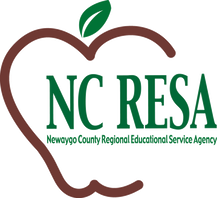 Notice of Vacancies The Newaygo County RESA is seeking applications for a Special Education Supervisor for the 2024-25 school year. Candidates must have a Master’s degree (minimum), a Michigan Department of Education teaching certificate with endorsements in special education, and the ability to obtain Michigan Department of Education approval as a Special Education Supervisor. Other desired qualifications and position details are available at www.ncresa.org under Employment. This position will remain open until filled. It is the policy of the Newaygo County RESA that no person shall, on the basis of race, color, religion, national origin, gender, age, height, weight, marital status or other trait or characteristic protected by federal or state employment discrimination statutes, be excluded from participation in, be denied the benefits of, or be subject to discrimination during programs, activities, and employment.  PUBLIC NOTICE: The Family Health Care White Cloud Child and Adolescent Health Center Advisory Council will meet on Monday, April 8, 2024, from noon to 1 p.m. at the Child and Adolescent Health Center conference room at 555 E. Wilcox Ave. The meeting is open to the public and lunch will be provided. For more information, please call (231) 689-3268. Officers recognized for length of service, deputies of the year
Photos by Misty Ingersoll Last Wednesday the County Board of Commissioners meeting room was undoubtedly the safest place to be as it was filled with law enforcement and other public safety personnel from around the area who packed the room along with former employees and co-workers. To begin with Sheriff Bob Mendham and Lieutenant John Borgman handed out pins commemorating years of service. Deputies Tyler Selby, Trevor Sherman, Clint Hicks, Rachael Botello, Dave Kalinowski, Heather Kelly, Pat Fetterly, Korey Sitzema, Brian Van Singel, and Zac Cantu have served for 5 years while Dylan Wimmer was recognized for 10 years and Deputy Pat Green topped the group having reached 20 years with the department. Retiring deputy Phil Green received an award for his 25 years. Deputy Jonathon Vanderwall and Sergeant Dustin Runions were named Deputies of the Year. Following the awards from the Sheriff’s Office two of the county’s best were honored by the Board. Central Dispatch Director Phil Smalligan started as a part time dispatcher 22 years ago before quickly being promoted to full time. In 2020 stepped into the leadership role at Central Dispatch providing vision and leadership to the department. Phil Green has served a quarter of a century with the Sheriffs OfficeWhile performing a number of duties in his career Phil is perhaps best known for being the K9 officer partnering with Turbo and Remi the worthy canine collaborators who served many years alongside Green. The former deputy spoke to the crowd as he thanked the many friends, colleagues, and mentors he has encountered in his years of service to the NCSO. In other business the Board approved four to the Newaygo County Mental Health Board, Kathy Broome, Helen Taube and Ken DeLaat were reappointed while Lori Schultz was appointed to fill a vacancy. The Board also approved a three year contract with Republic Services for Household Hazardous Waste events. This year's Household Hazardous Waste Day is Saturday May 18th and will once again be held at the Newaygo County Road Commission. |
CategoriesArchives
April 2024
|
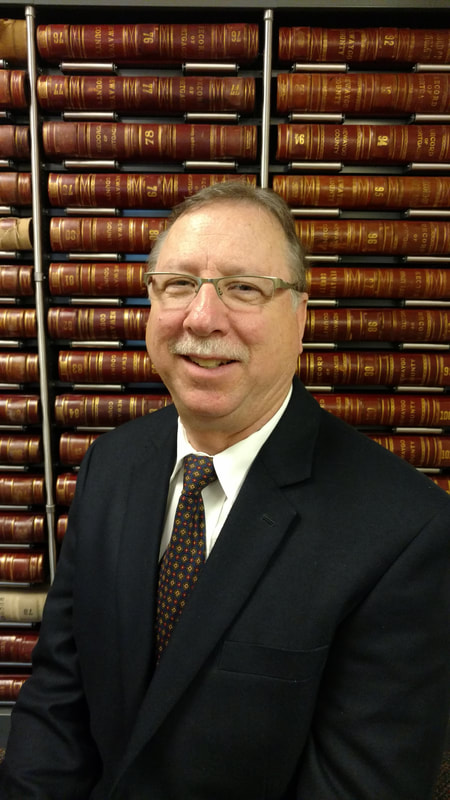
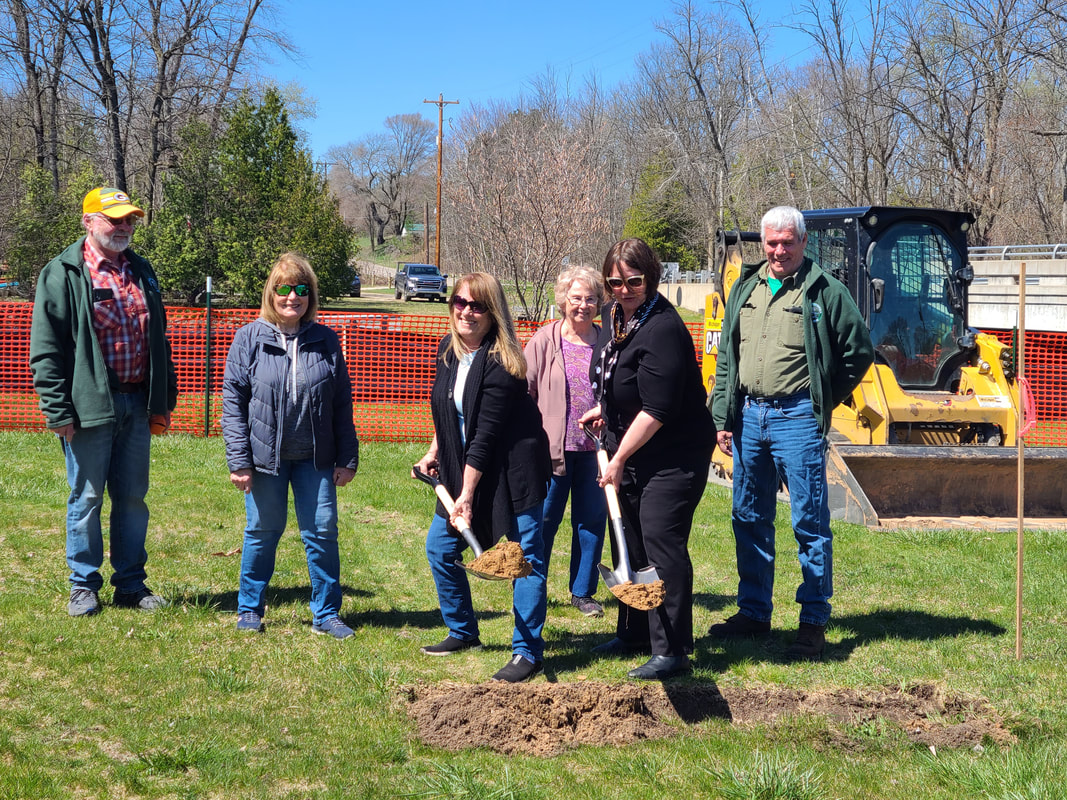
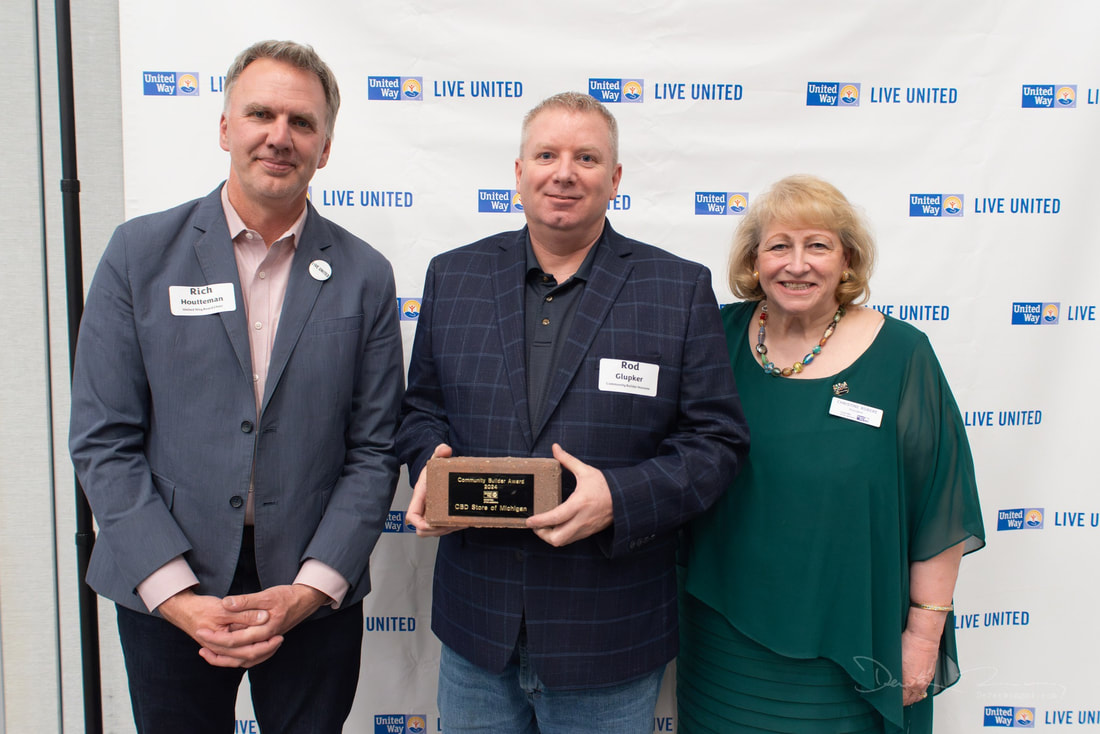
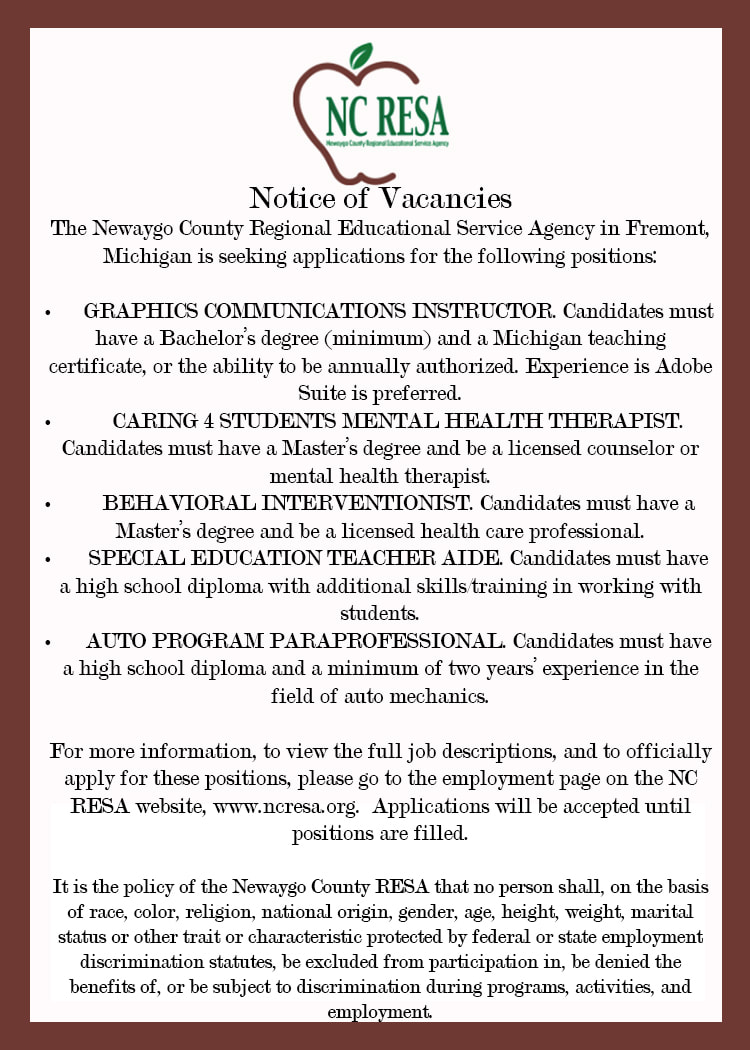
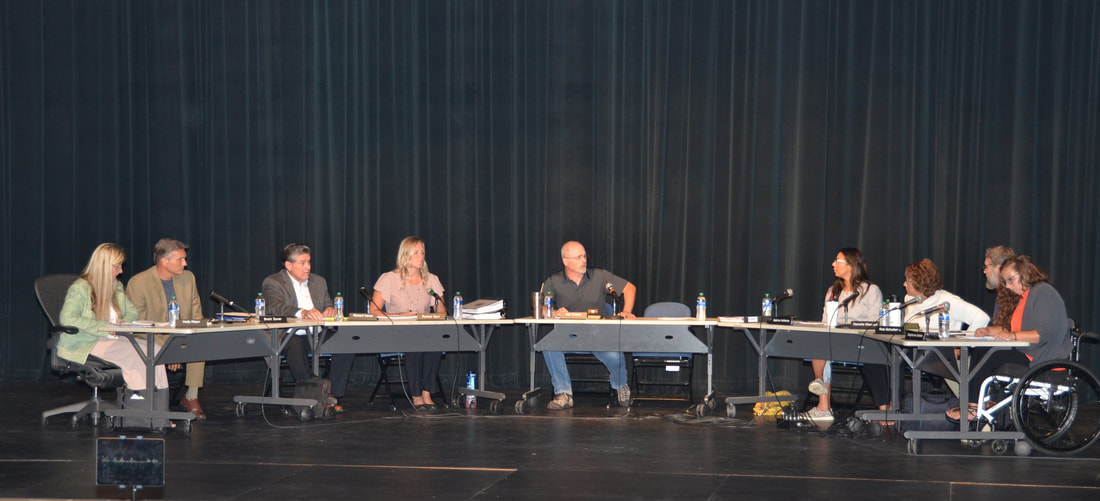
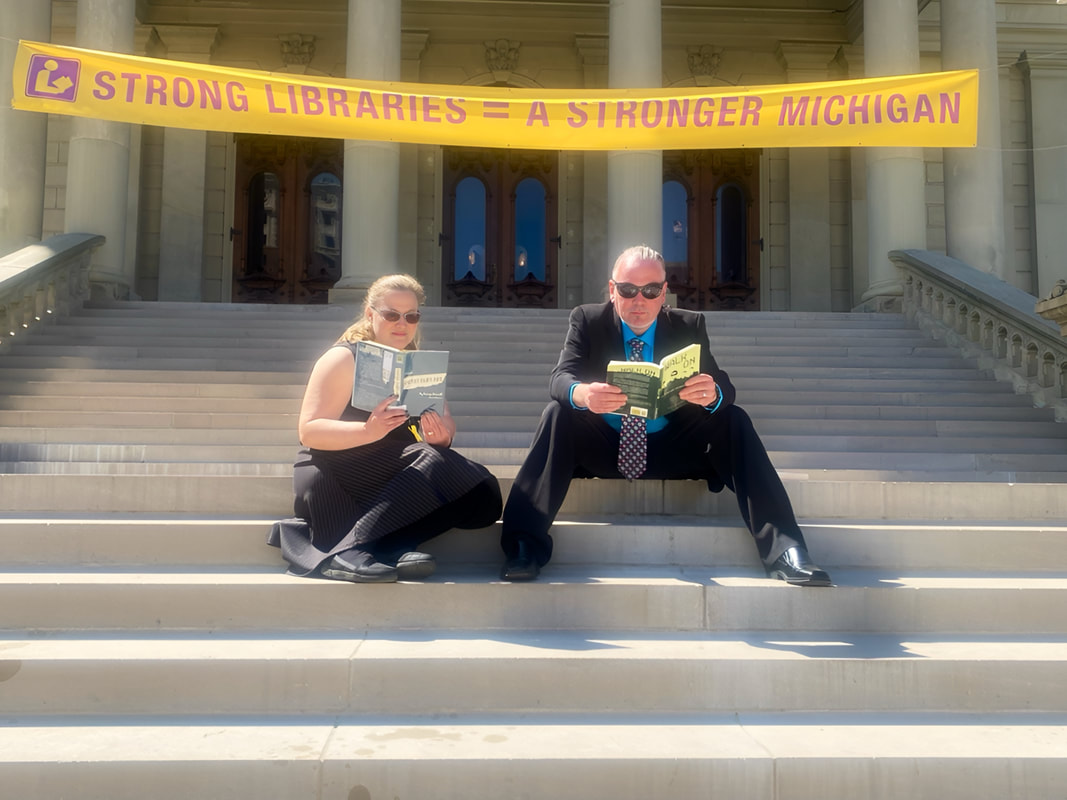
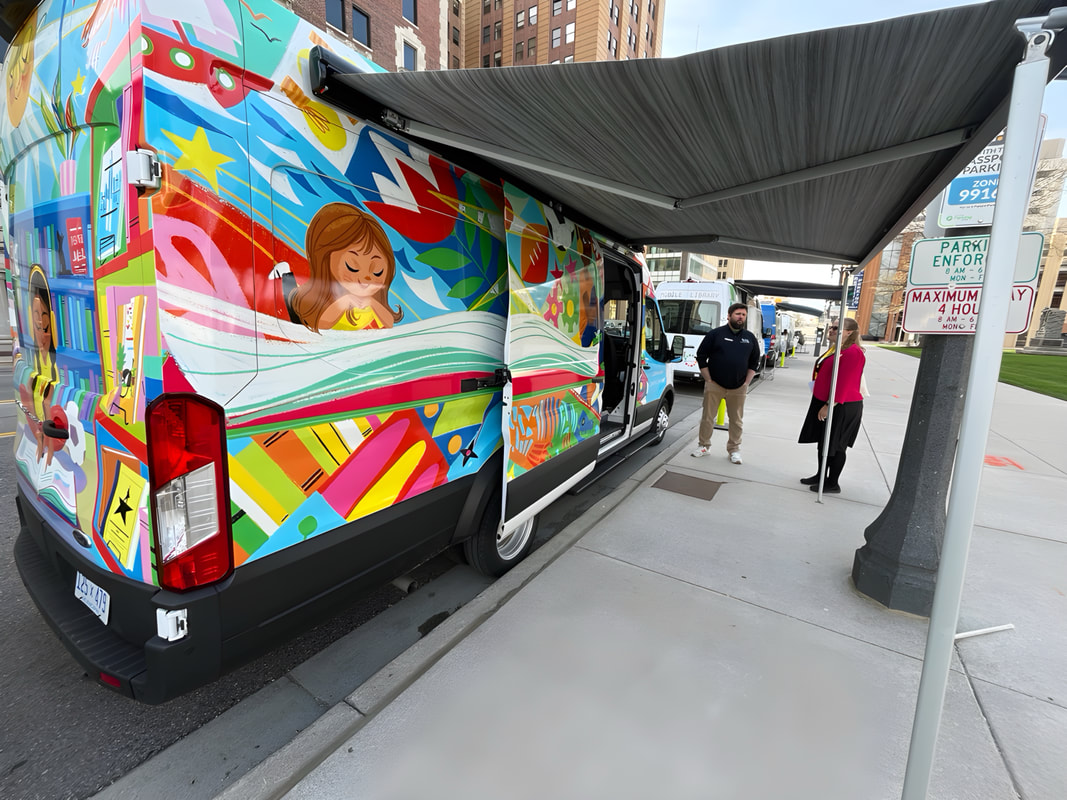
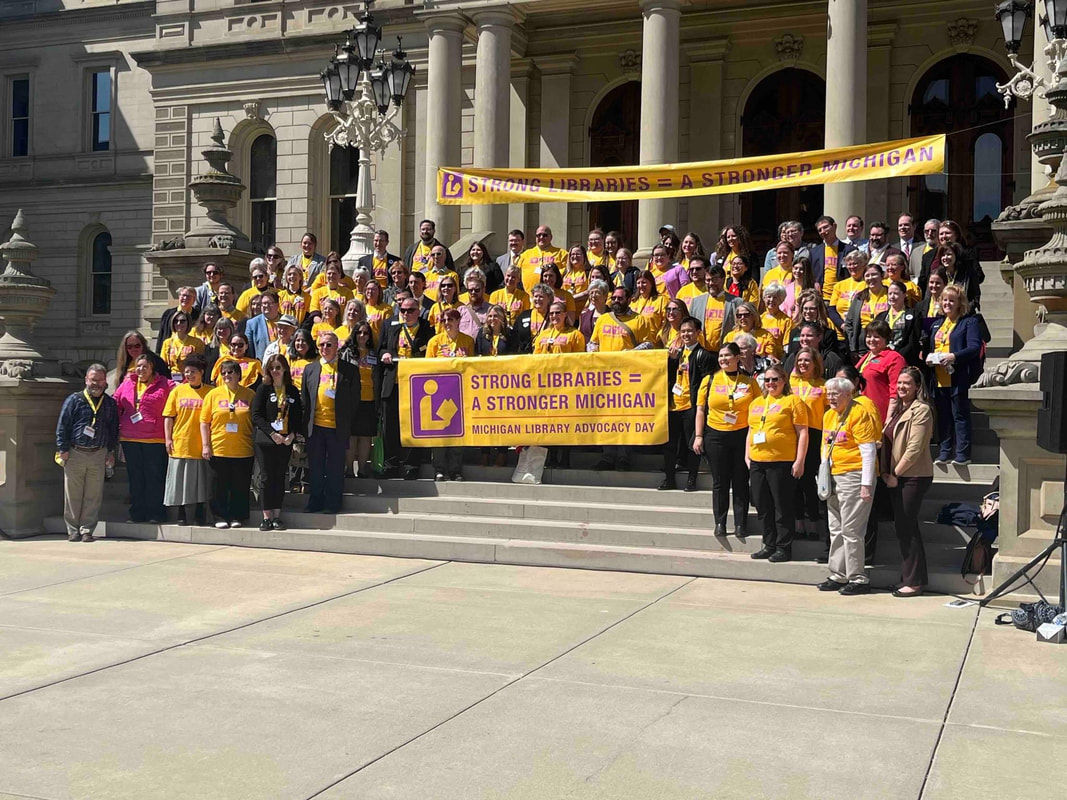
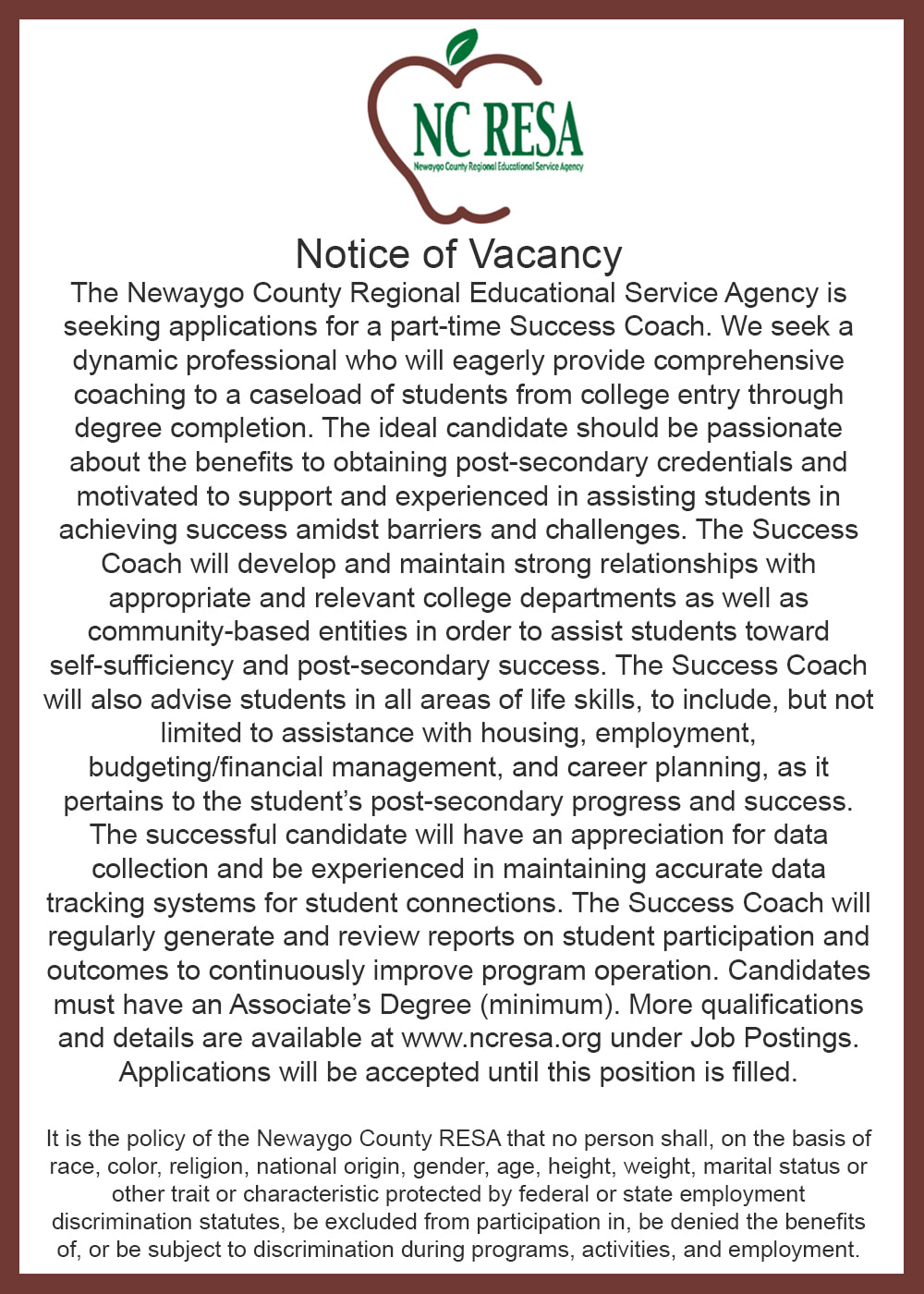
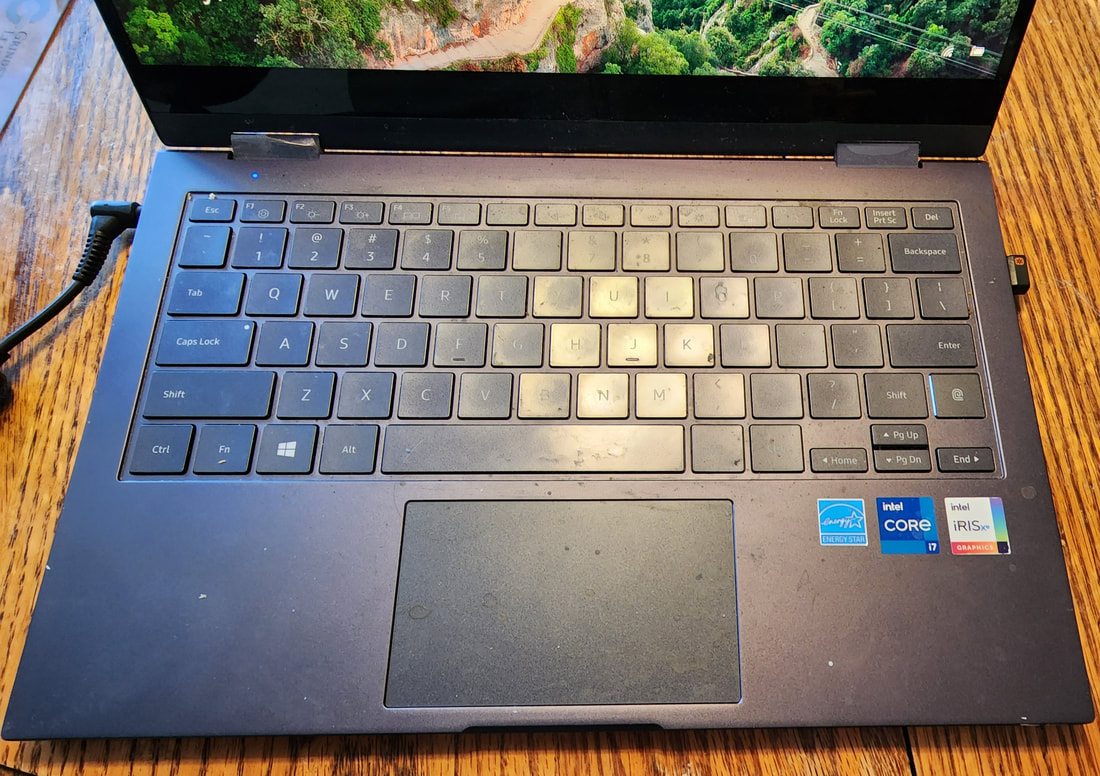
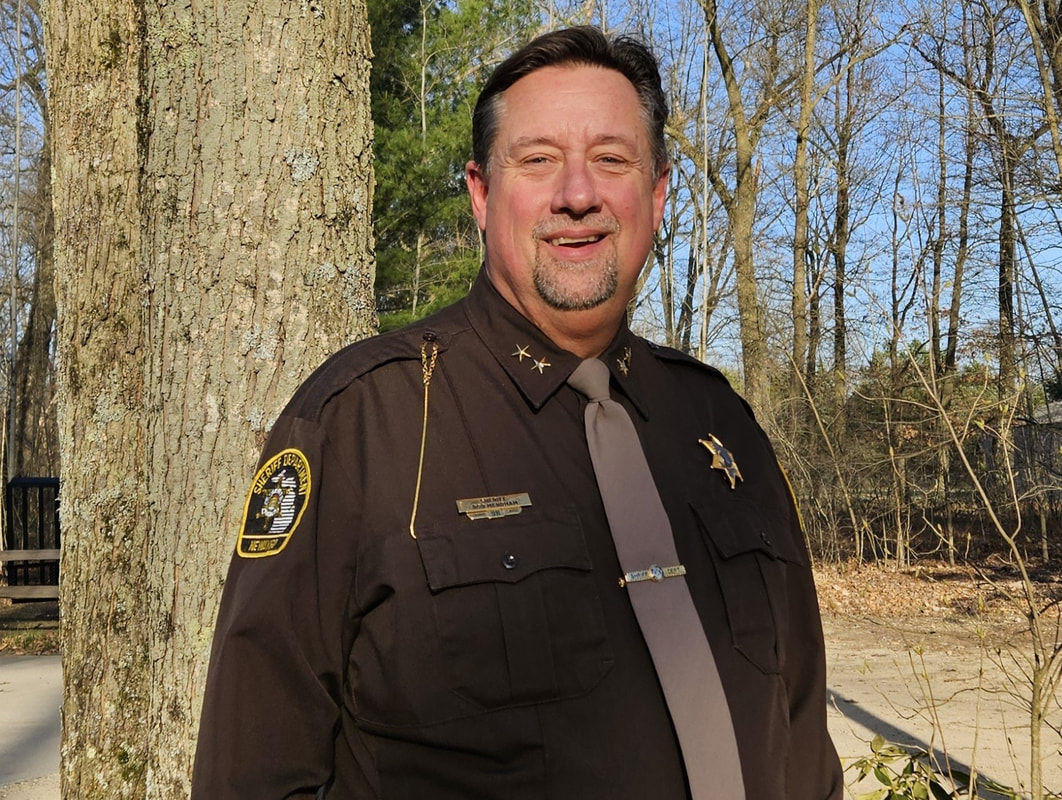
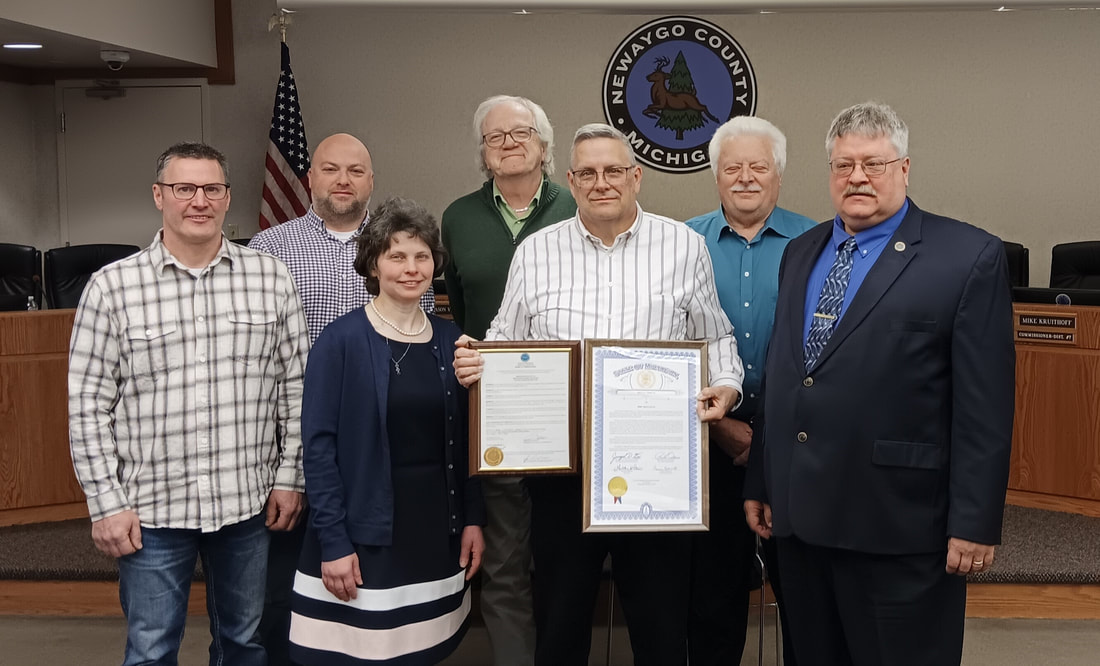
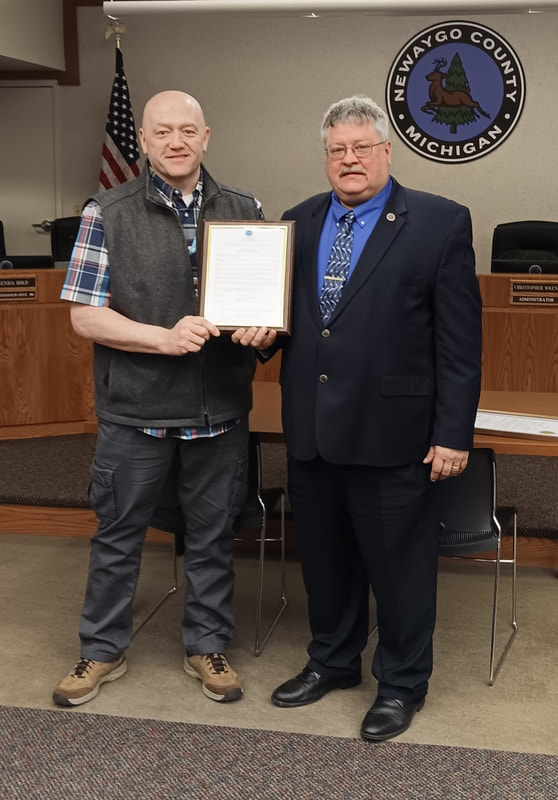
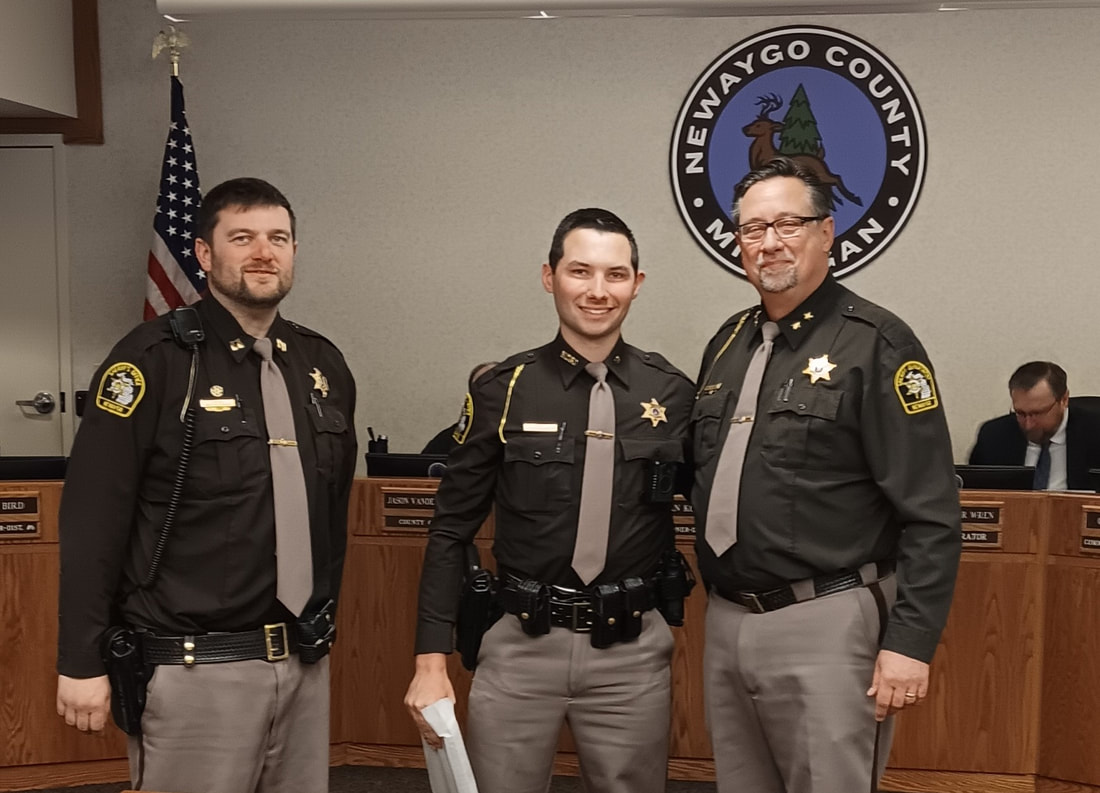
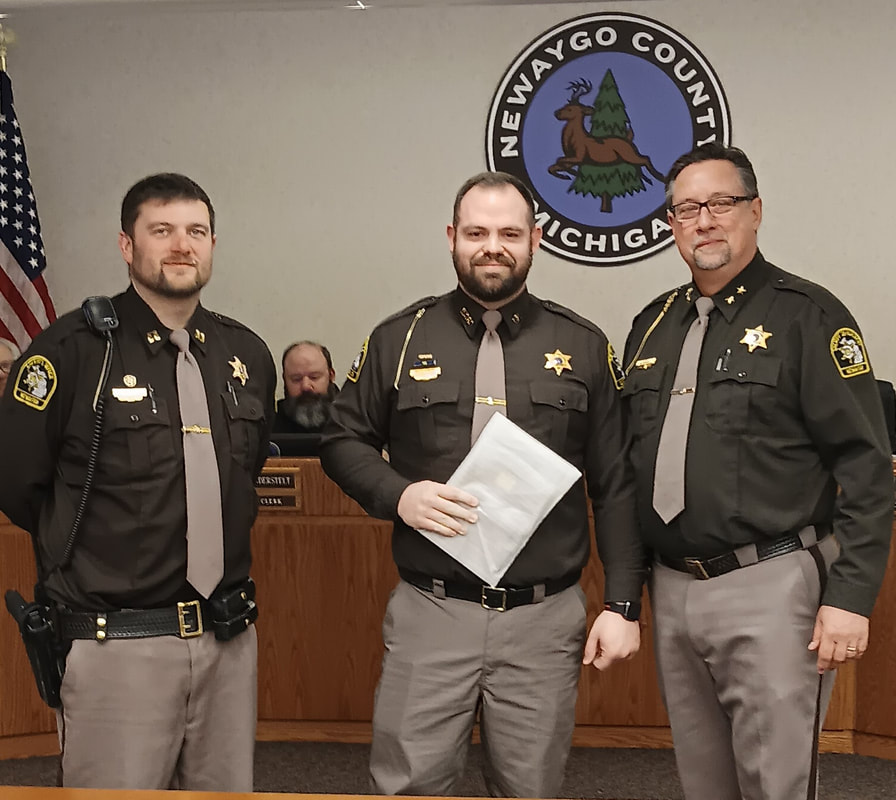

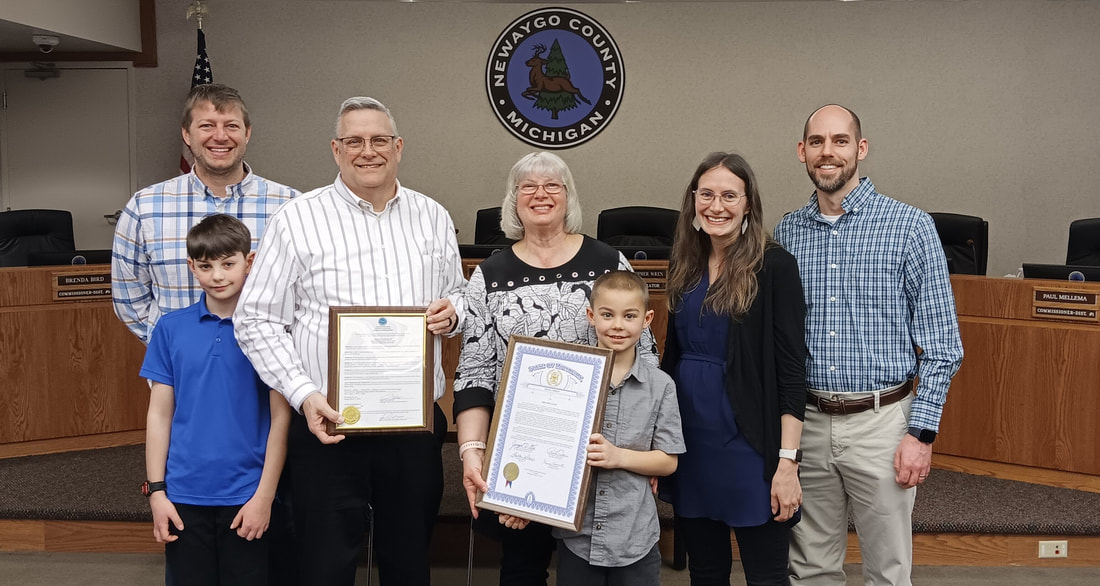
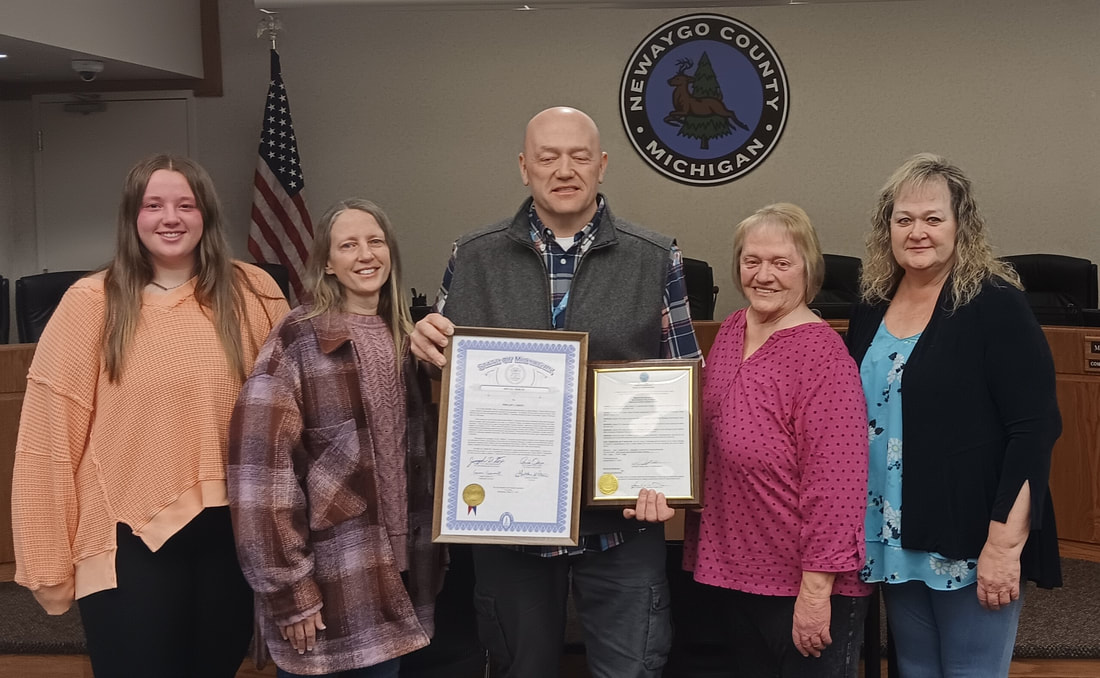
 RSS Feed
RSS Feed